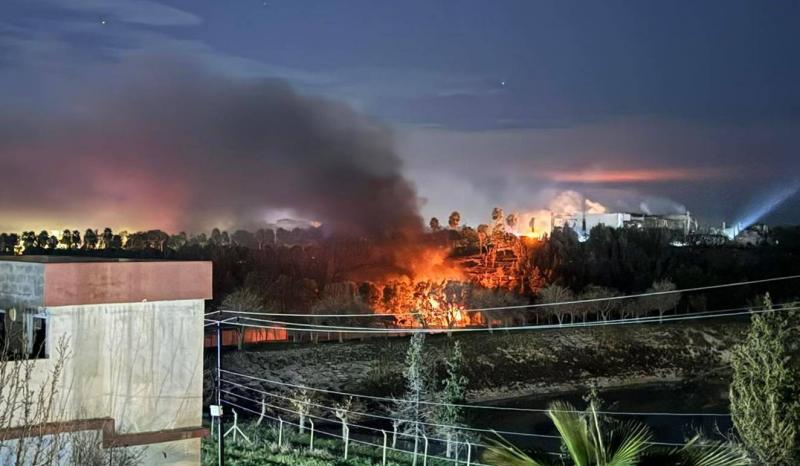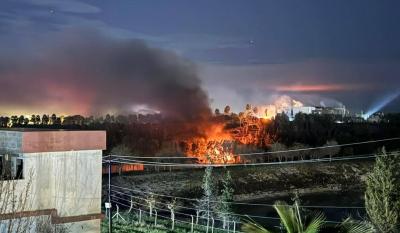Iranian state media reported late Monday that the Iranian Revolutionary Guard announced it attacked an "Israeli espionage headquarters" in Iraq's Kurdistan region and targeted the Islamic State (ISIS) in Syria. The missile strikes come amid fears of escalating conflict that has spread across the Middle East since the outbreak of war between Israel and the Palestinian Islamic Resistance Movement (Hamas) in Gaza on October 7, coinciding with the involvement of Iranian allies in Lebanon, Syria, Iraq, and Yemen.
The Iranian Revolutionary Guard stated, "In response to the recent malicious acts of the Zionist entity, which led to the martyrdom of Revolutionary Guard leaders and the resistance axis, one of the main headquarters of the Zionist Mossad in the Kurdistan region of Iraq has been targeted and destroyed." It added, "This headquarters was a center for expanding espionage operations and planning terrorist actions in the region, particularly within Iran."
Iran vowed to avenge the deaths of three Revolutionary Guard members in Syria last month, including a senior commander, who were working as military advisors there. Since Hamas fighters launched an attack on Israeli territory on October 7, followed by Israeli bombardments of Gaza and Lebanon, more than 130 Hezbollah militants have been killed in the hostilities.
The Revolutionary Guard's statement assured the honored people that its offensive operations would continue until revenge is achieved for every drop of the martyrs' blood. In addition to missile attacks launched in a residential area northeast of Erbil, the capital of the Kurdistan Region, and near the U.S. consulate, the Revolutionary Guard claimed it "fired a number of ballistic missiles at Syria and destroyed the perpetrators of terrorist operations" in Iran, particularly ISIS.
The U.S. Condemns the "Reckless" Erbil Attack
The U.S. State Department condemned the attacks near Erbil, describing them as "reckless." U.S. officials stated that no American facilities were targeted and no Americans were harmed. Adrienne Watson, spokesperson for the National Security Council at the White House, said in a statement, "We tracked the missiles that landed in northern Iraq and northern Syria. No Americans or U.S. facilities were targeted." She added, "We will continue to assess the situation, but initial indicators suggest these were a series of reckless and imprecise strikes," noting that "the United States supports Iraq's sovereignty, independence, and territorial integrity."
Earlier this month, ISIS claimed responsibility for explosions in Kerman, southeastern Iran, resulting in nearly 100 deaths and dozens of injuries at a memorial for top military commander Qassem Soleimani. Iran, which supports Hamas in its war with Israel, accuses the United States of backing what it describes as Israeli crimes in Gaza. The U.S. has stated it supports Israel in its campaign but has expressed concern about the number of Palestinian civilians killed in the war.
"A Crime Against the Kurdish People"
In a statement from his office, Masrour Barzani, the Prime Minister of the Kurdistan Region, condemned the attack on Erbil as "a crime against the Kurdish people." The Security Council of the Kurdistan Regional Government stated that at least four civilians were killed and six others injured in the attacks on Erbil, describing the attack as "a crime."
Iraqi security and medical sources reported that prominent Kurdish businessman Pishro Dzi was among the dead when at least one missile struck his home, along with several family members. Dzi, who is close to the ruling Barzani clan, owns companies that led major real estate projects in Kurdistan. Iraqi security sources also reported that a missile struck the home of a senior Kurdish intelligence official and another targeted a Kurdish intelligence center.
Iran has previously carried out strikes in the Kurdistan region of northern Iraq, claiming the area is used as a launchpad for Iranian separatist groups and Israeli agents. Baghdad has attempted to address Iranian concerns regarding separatist groups in the mountainous border region, moving some of their members under a security agreement reached with Tehran in 2023.




